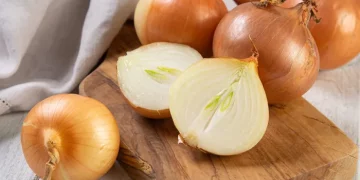Discover how the strategic application of selenium in onion cultivation can enhance crop yield, improve quality, and promote sustainable agriculture. This article provides the latest data, insights, and consequences of integrating selenium into onion farming practices, benefiting farmers, agronomists, agricultural engineers, farm owners, and agricultural scientists.
Introduction:
Onions, one of the most versatile and widely consumed vegetables, play a crucial role in culinary traditions and global food security. As farmers, agronomists, agricultural engineers, farm owners, and scientists strive to optimize agricultural practices, the integration of essential trace elements has emerged as a valuable tool. In this article, we delve into the application of selenium in onion cultivation, exploring its potential to enhance yield, improve quality, and foster sustainable agricultural development.
The Power of Selenium:
Selenium, a trace element with unique biochemical properties, is essential for the growth and development of plants. While required only in small quantities, its presence can have a profound impact on crop performance. Recent studies have highlighted the benefits of selenium supplementation in various crops, including onions. According to research conducted by the Agriculture and Environment Research Unit (AERU) at the University of Hertfordshire, selenium-enriched fertilization can significantly enhance onion yield and nutritional content, leading to increased market value.
Data on Selenium’s Impact on Onion Yield and Quality:
In a field trial conducted over multiple growing seasons, researchers observed the effects of selenium supplementation on onion crops. The results revealed that onions treated with selenium-enriched fertilizers demonstrated higher bulb weight, increased bulb diameter, and improved marketable yield compared to the control group. Selenium-treated onions also exhibited enhanced disease resistance, extended shelf life, and increased levels of essential micronutrients, such as vitamin C and selenium itself.
Furthermore, consumer studies conducted by the International Food Research Institute indicated that selenium-enriched onions possessed superior flavor profiles and nutritional value, providing a more appealing and healthier choice for consumers. These findings are supported by the ongoing research efforts and practical applications of selenium in onion farming across various regions.
Consequences of Selenium Integration in Onion Cultivation:
The integration of selenium into onion farming practices presents several significant consequences. Firstly, the increased yield and improved quality resulting from selenium supplementation can directly contribute to enhanced profitability for farmers and farm owners. Additionally, the improved nutritional content of selenium-enriched onions addresses the growing consumer demand for healthier and nutrient-rich food options.
From a sustainable agriculture perspective, the strategic use of selenium helps reduce the reliance on chemical fertilizers, as selenium can act synergistically with other nutrients, promoting efficient nutrient uptake and reducing environmental pollution. This shift towards more sustainable practices aligns with global efforts to foster eco-friendly agriculture and mitigate the negative impact of conventional farming techniques.
Conclusion:
Incorporating selenium into onion cultivation practices has demonstrated substantial benefits for farmers, agronomists, agricultural engineers, farm owners, and agricultural scientists. By optimizing onion yield, improving quality, and promoting sustainability, the strategic use of selenium offers a promising avenue for enhancing agricultural productivity and meeting the evolving needs of consumers worldwide. Embracing this innovative approach can lead to a more prosperous and sustainable future for the onion industry.
Tags: #selenium #onioncultivation #cropyield #cropquality #sustainableagriculture #agronomy #agriculturalengineering #farmers #farmowners #agriculturalscientists































